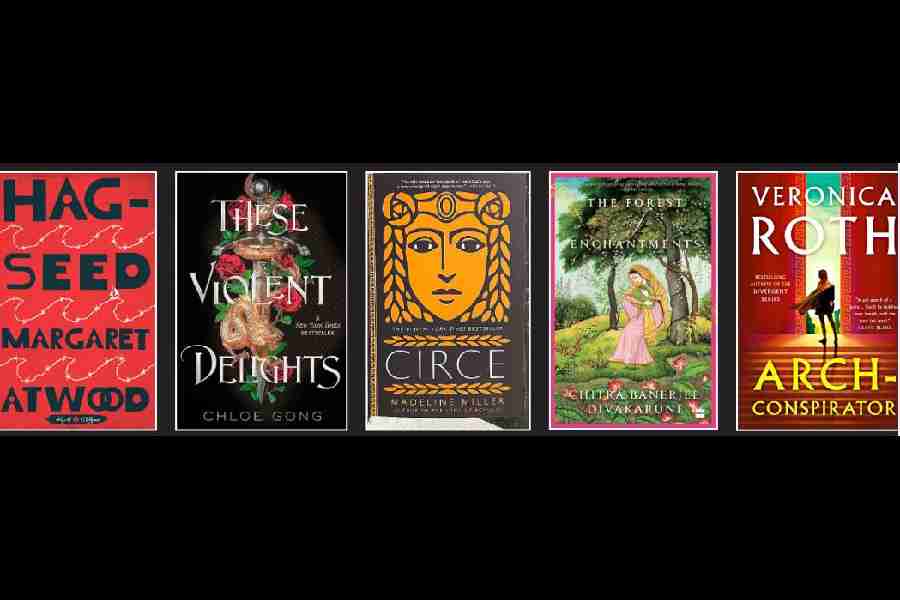Since the beginning of time, stories have been passed down through centuries, adapted and retold over and over. Today the popular idea of fan fiction is still painted with a certain prejudice about its literary value. While it could be argued that canonical works of literature like Milton’s Paradise Lost and Dante’s Inferno are technically Bible fanfiction, the actual history of fan fiction and retellings can be dated to the eighteenth century with novelists like Henry Fielding, whose works have gained their place in the literary canon. Here are some recent intriguing adaptations of age-old myths and stories.
Hag-Seed by Margaret Atwood (2016)
The best-selling author of The Handmaid’s Tale, once again showcases her literary prowess and an ability to bridge the gap between the past and the present through this retelling of one of the most well-known Shakespearean plays, The Tempest. Hag-Seed is the story of Felix Phillips, a theatre director at the Makeshiweg theatre festival, who is betrayed and ousted from his prestigious position and seeks solace in exile-like seclusion. Throughout almost a decade of this exile, Felix copes with the loss of his wife and his daughter Miranda by creating an imaginary persona of his daughter. But driven by an aching desire for revenge, Felix embarks on a bold and inventive plan to stage his version of The Tempest, at a correctional facility he finds work in, casting inmates as his actors. Atwood carefully weaves together the tale of a once exiled King and Felix and lines are blurred between fiction and truth in a potent mixture of a multi-dimensional narrative that highlights the timelessness of the powerful emotions that hold over human existence.
Circe by Madeline Miller (2018)
The author of The Song of Achilles delves into the ancient world of Greek mythology once again as she captivates her readers with an enchanting tale of the nymph, goddess and sorceress Circe. Miller masterfully weaves a narrative that explores the depths of power, love and enduring strength of a woman. The novel follows Circe’s journey as it unfolds in a remarkable blend of lyricism and authenticity, from her birth as a daughter of a naiad and Helios, the sun god, to her banishment to the island of Aeaea. We witness iconic figures like Odysseus, Hermes, and the Minotaur in Miller’s retelling as Circe navigates life among gods and mortals. Through her iconic style, Miller brings a fresh perspective to the immortal Circe’s story, which is at its core the story of a woman who is an outsider to the worlds of the gods and of men but despite all odds Circe endures through sheer will, and through Miller’s re-imagination of the character new light is shed on narratives that have built up ancient myths where characters like Circe end up being only an obstacle for heroes to defeat.
The Forest of Enchantments by Chitra Banerjee Divakaruni (2019)
The author of The Palace of Illusions invites her readers once more to the enthralling world of Indian mythology where ancient tales and timeless wisdom are bound together. The novel is a first-person narration by Sita, the well-known and revered heroine of the Indian epic Ramayana. Through this retelling of Sita’s story Divakaruni explores the themes of love, duty, and the indomitable nature of womanhood that is sidelined in history. The novel gives voice to Sita’s perspective of events that are all too familiar — her wedding to Ram, their exile, her abduction and eventual abandonment. Divakaruni does not stop with Sita but gives voice to women all across the Ramayana like Kaikeyi, Ahalya, and Surpanakha, poking and prodding at the boundaries of what is defined as good and bad in a male-dominated world. This retelling humanises the mythic and god-like figures of the epic giving power to those who are historically deprived of it and proves to be a tale which holds relevance in women’s lives even now, in the 21st century.
These Violent Delights by Chloe Gong (2020)
Chloe Gong’s debut novel once again proves that literature and storytelling are eternal parts of human existence. The novel transports us to 1920’s Shanghai, but the tale echoes the woes of the quintessential Shakespearean tragedy, with its Romeo Juliet-like plotline. Gong’s masterful retelling takes the well-known tale of forbidden love and combines that with the dangerous realities of revolution, gang warfare, and the vibrancy of the rich cultural world of 1920s Shanghai. The city plagued by an unknown monster spreading sickness irrespective of alliances marks an uncanny similarity to the world in 2020, and as Juliette Cai and Roma Montagov, dip their toes into the thrilling waters of a passionate love affair they must also navigate age-old dichotomies that come with the territory of being on opposing sides of a war. A thrilling tale of loyalty, romance, violence and tragedy Chole Gong brings back the excitement of reading a Shakespearean tale in this retelling.
Arch Conspirator by Veronica Roth (2023)
From the author of the iconic Divergent series, Arch Conspirator is a venture into the world of retold stories in her iconic style. The novel, set in a post-apocalyptic and radiation-plagued world, is a retelling of the canonical Greek tragedy, Sophocles’ Antigone. Roth explore (es similar themes of family loyalty, hubris, religious belief, and one’s autonomy over one’s own body through the tale of Antigone and her siblings who are born by natural means in a world where genetical modification was the predominant way of birth. Through the various perspectives of the characters, the story weaves itself against the original tale as the siblings gain refuge from their uncle Kreon who overthrew their parents. Overall the novel provides a new and layered perspective about the role of women in a civilization where childbirth is an extremely politicised event, all the while remaining true to the original play and Antigone’s unyielding strength to choose right from wrong despite the consequences.











